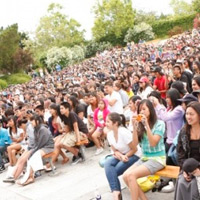By Jon Melegrito
Washington, DC. – Recently-released U.S. Census figures indicate that there are 2,555,923 Filipinos in the United States today. The more than 2.5 million is a 38 per cent increase from the 1.8 million counted 10 years ago.

These figures, however, only represent counts of “Filipino Alone” responses to the 2010 census survey. Based on Census 2000 and 2008 Population Estimates, it is projected that the total will increase by 20 per cent when the count for “Mixed-Race Filipinos” is added by the end of the summer. If these estimates hold, the total number could top 3.5 million.
As expected, the largest population is in California, where 1,195,580 Filipinos constitute 3.2 percent of all the people in the state. Hawaii comes second with 197,497, followed by Illinois, 114,724; New Jersey, 110,650; New York, 104,287; Texas, 103,074; Nevada, 98,351; Washington, 91,367; Florida, 90,223; Virginia, 66,963; Maryland, 43,923; and Arizona, 35,013.
Filipinos in Nevada continue to have the highest rate of growth nationwide. Their numbers jumped from 12,048 in 1990 to 40,529 in 2000 – a dramatic increase of 236 percent – more than doubling again in 2010 with 98,351, an increase of 142 percent. Next to Filipinos in Hawaii who constitute 14.5 percent of the total state population, Nevada’s Filipinos comprise 3.6 percent – enough to swing a close election.
The 2010 census also points to significant growth of Filipino communities in Arizona – with a 116 percent rise – followed by North Carolina, 94 percent; Wyoming, 91 percent; Idaho, 87 percent; Alabama, 82 percent; New Hampshire, 81 percent; Utah, 80 percent; Texas, 77 percent; and New Mexico, 72 percent.
Attached is a state-by-state breakdown, indicating the percentage increase from the last census. These figures were compiled with the assistance of Gem Daus, an Asian American studies professor at the University of Maryland.
“This is great news but our numbers alone won’t count unless we translate them into political power,” says NaFFAA National Chairman Eduardo Navarra. “This means we have to register to vote and take time to actually go out and cast our ballots in local and national elections. This is the only effective way we can be heard and taken seriously by our elected representatives when we advocate for those issues that are critical to our community.”
Adds Merit Salud, NaFFAA’s national coordinator for FilVote: “While we have a high rate of naturalization and voter registration, our voting rate is embarrassingly low. We can not continue to be invisible. We must assert our political presence in this country by stepping up our civic participation in all aspects of American life.”
FilVote plans to launch a massive voter registration and get-out-the-vote campaign in preparation for the 2012 national elections.



 ShareThis
ShareThis